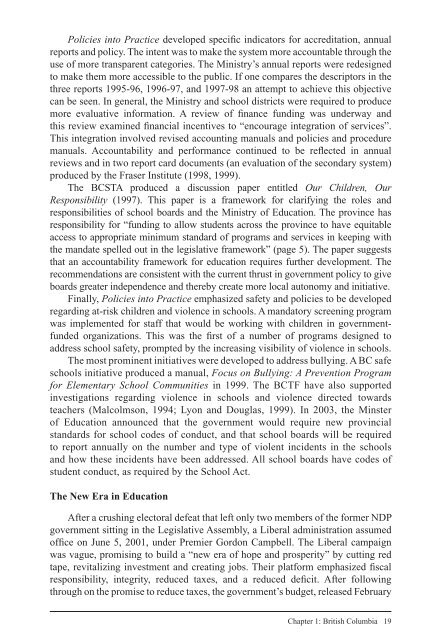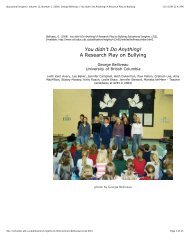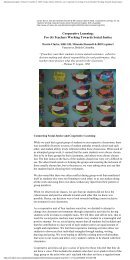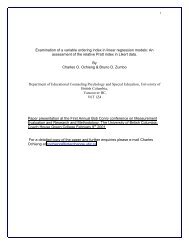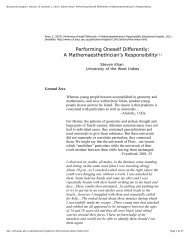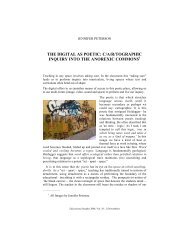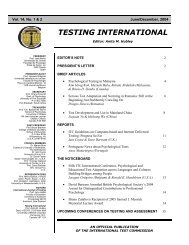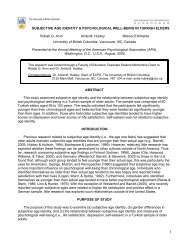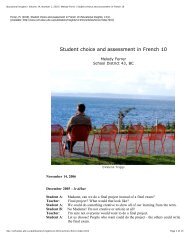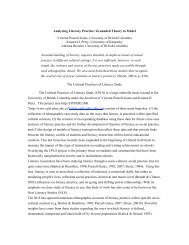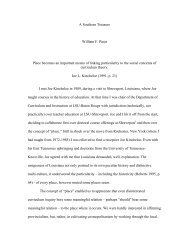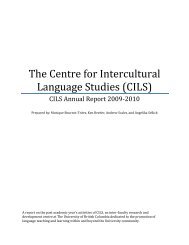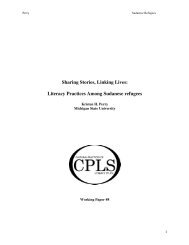The evolution of professionalism - Centre for Policy Studies in ...
The evolution of professionalism - Centre for Policy Studies in ...
The evolution of professionalism - Centre for Policy Studies in ...
You also want an ePaper? Increase the reach of your titles
YUMPU automatically turns print PDFs into web optimized ePapers that Google loves.
Policies <strong>in</strong>to Practice developed specifi c <strong>in</strong>dicators <strong>for</strong> accreditation, annual<br />
reports and policy. <strong>The</strong> <strong>in</strong>tent was to make the system more accountable through the<br />
use <strong>of</strong> more transparent categories. <strong>The</strong> M<strong>in</strong>istry’s annual reports were redesigned<br />
to make them more accessible to the public. If one compares the descriptors <strong>in</strong> the<br />
three reports 1995-96, 1996-97, and 1997-98 an attempt to achieve this objective<br />
can be seen. In general, the M<strong>in</strong>istry and school districts were required to produce<br />
more evaluative <strong>in</strong><strong>for</strong>mation. A review <strong>of</strong> fi nance fund<strong>in</strong>g was underway and<br />
this review exam<strong>in</strong>ed fi nancial <strong>in</strong>centives to “encourage <strong>in</strong>tegration <strong>of</strong> services”.<br />
This <strong>in</strong>tegration <strong>in</strong>volved revised account<strong>in</strong>g manuals and policies and procedure<br />
manuals. Accountability and per<strong>for</strong>mance cont<strong>in</strong>ued to be refl ected <strong>in</strong> annual<br />
reviews and <strong>in</strong> two report card documents (an evaluation <strong>of</strong> the secondary system)<br />
produced by the Fraser Institute (1998, 1999).<br />
<strong>The</strong> BCSTA produced a discussion paper entitled Our Children, Our<br />
Responsibility (1997). This paper is a framework <strong>for</strong> clarify<strong>in</strong>g the roles and<br />
responsibilities <strong>of</strong> school boards and the M<strong>in</strong>istry <strong>of</strong> Education. <strong>The</strong> prov<strong>in</strong>ce has<br />
responsibility <strong>for</strong> “fund<strong>in</strong>g to allow students across the prov<strong>in</strong>ce to have equitable<br />
access to appropriate m<strong>in</strong>imum standard <strong>of</strong> programs and services <strong>in</strong> keep<strong>in</strong>g with<br />
the mandate spelled out <strong>in</strong> the legislative framework” (page 5). <strong>The</strong> paper suggests<br />
that an accountability framework <strong>for</strong> education requires further development. <strong>The</strong><br />
recommendations are consistent with the current thrust <strong>in</strong> government policy to give<br />
boards greater <strong>in</strong>dependence and thereby create more local autonomy and <strong>in</strong>itiative.<br />
F<strong>in</strong>ally, Policies <strong>in</strong>to Practice emphasized safety and policies to be developed<br />
regard<strong>in</strong>g at-risk children and violence <strong>in</strong> schools. A mandatory screen<strong>in</strong>g program<br />
was implemented <strong>for</strong> staff that would be work<strong>in</strong>g with children <strong>in</strong> governmentfunded<br />
organizations. This was the fi rst <strong>of</strong> a number <strong>of</strong> programs designed to<br />
address school safety, prompted by the <strong>in</strong>creas<strong>in</strong>g visibility <strong>of</strong> violence <strong>in</strong> schools.<br />
<strong>The</strong> most prom<strong>in</strong>ent <strong>in</strong>itiatives were developed to address bully<strong>in</strong>g. A BC safe<br />
schools <strong>in</strong>itiative produced a manual, Focus on Bully<strong>in</strong>g: A Prevention Program<br />
<strong>for</strong> Elementary School Communities <strong>in</strong> 1999. <strong>The</strong> BCTF have also supported<br />
<strong>in</strong>vestigations regard<strong>in</strong>g violence <strong>in</strong> schools and violence directed towards<br />
teachers (Malcolmson, 1994; Lyon and Douglas, 1999). In 2003, the M<strong>in</strong>ster<br />
<strong>of</strong> Education announced that the government would require new prov<strong>in</strong>cial<br />
standards <strong>for</strong> school codes <strong>of</strong> conduct, and that school boards will be required<br />
to report annually on the number and type <strong>of</strong> violent <strong>in</strong>cidents <strong>in</strong> the schools<br />
and how these <strong>in</strong>cidents have been addressed. All school boards have codes <strong>of</strong><br />
student conduct, as required by the School Act.<br />
<strong>The</strong> New Era <strong>in</strong> Education<br />
After a crush<strong>in</strong>g electoral defeat that left only two members <strong>of</strong> the <strong>for</strong>mer NDP<br />
government sitt<strong>in</strong>g <strong>in</strong> the Legislative Assembly, a Liberal adm<strong>in</strong>istration assumed<br />
<strong>of</strong>fi ce on June 5, 2001, under Premier Gordon Campbell. <strong>The</strong> Liberal campaign<br />
was vague, promis<strong>in</strong>g to build a “new era <strong>of</strong> hope and prosperity” by cutt<strong>in</strong>g red<br />
tape, revitaliz<strong>in</strong>g <strong>in</strong>vestment and creat<strong>in</strong>g jobs. <strong>The</strong>ir plat<strong>for</strong>m emphasized fi scal<br />
responsibility, <strong>in</strong>tegrity, reduced taxes, and a reduced defi cit. After follow<strong>in</strong>g<br />
through on the promise to reduce taxes, the government’s budget, released February<br />
Chapter 1: British Columbia 19


